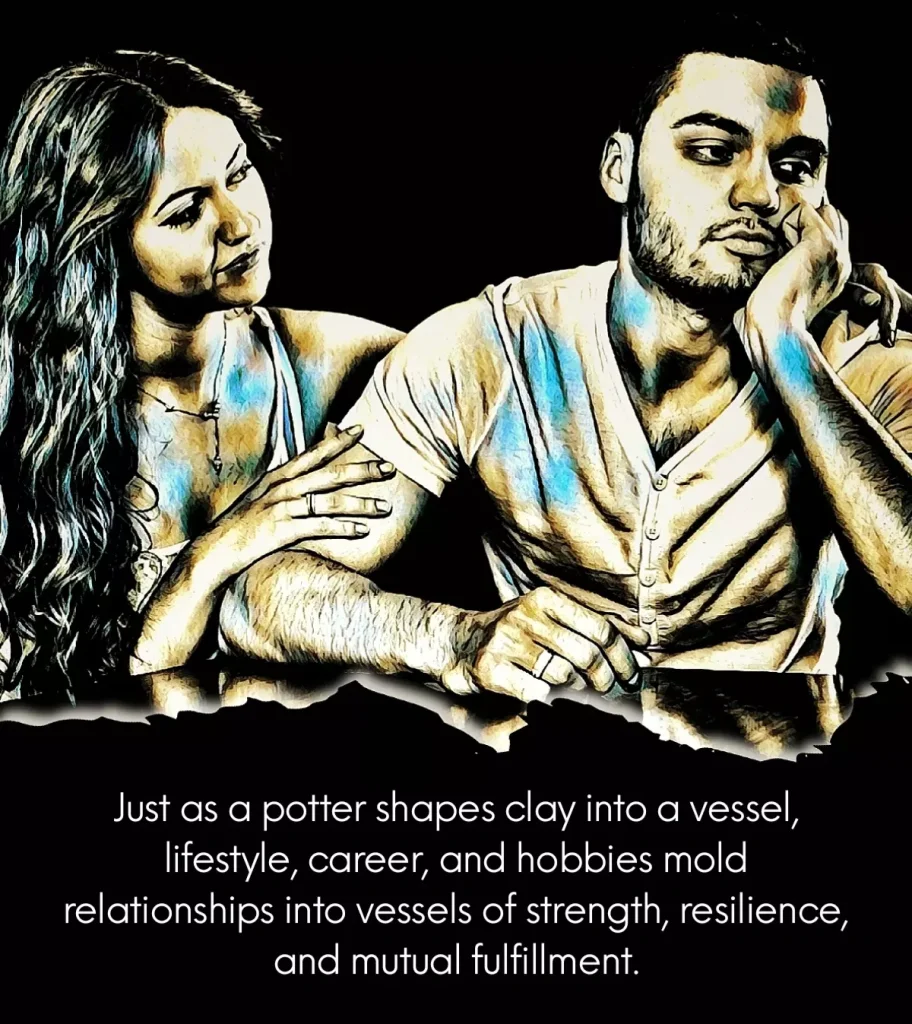9 dynamic ways lifestyle, career, and hobbies shape relationships
This blog post may contain affiliate links. If we find a product or service to be useful, we encourage you to visit the website via that link. If you make a purchase through our referral link, we may receive a commission. Rest assured, you will not be charged any additional fees. By using these links, you can support us while making your purchase. For more information visit here.
Imagine two couples: one bonds by cooking healthy meals together every night, while the other constantly fights because one gets up early for work and the other likes to sleep late.
The things we do every day (lifestyle), our jobs (career), and the activities we enjoy outside of work (hobbies) can both strengthen our relationships and sometimes cause problems.
Let’s see how these things act like a double-edged sword. How can these elements simultaneously benefit and hinder our romantic relationships in unexpected ways?
The Three Big Influencers
Forget boring definitions! Let’s talk about how the things we do every day really affect our relationships.
Lifestyle:
This is all about your daily routines, how you take care of yourself, and how you handle your money. Do you prefer to sleep late or wake up with the sunrise?
Eat healthy meals or grab fast food on the go? These choices can impact your relationships.
Career:
This refers to your job, what you strive for, and the stress it might bring home with you. Does your career require you to work late or travel frequently?
Does it make you feel fulfilled or frustrated?
Hobbies:
These are the activities you enjoy outside of work. They’re your “me-time,” and sometimes a way to relax after dealing with any challenges.
Do you love spending time outdoors or curling up with a good book?
These three things—lifestyle, career, and hobbies—can all shape our relationships in both positive and negative ways.
We’ll explore exactly how that happens next!
How Lifestyle, Career, and Hobbies Shape (or Sabotage) Your Relationships!
The Double-edged Sword: 9 Dynamic Ways That Shape Our World (Positive and Negative)!
Do you ever wonder why you click with some people but not others? It’s not just luck! Here are 9 dynamic ways your lifestyle, career, and hobbies can shape (or sabotage) your relationships, for better or worse!
Get ready to unlock the secret superpowers that make connections strong and build a team that’s ready to tackle anything together!
1. Shared Rhythms, Shared Bliss (But Beware the Routine Rut)
Ever wake up feeling like you’re on the same wavelength as your partner? Perhaps you both relish a morning jog and then share a healthy breakfast together.
Perhaps you have similar work schedules, allowing for shared evenings filled with cooking and conversation. These shared rhythms can be a recipe for relationship bliss!
There’s a reason for that. When you and your significant other have similar daily routines, it creates a sense of connection and shared experience.
It feels like you’re on the same team, tackling life’s slight setbacks together. (Like a well-oiled machine, running smoothly and keeping you both happy.)
But wait a minute! Shared routines, while amazing, can morph into a double-edged sword.
Sure, predictability and shared activities are the peanut butter and jelly of a happy relationship, but fall into a rut, and things can get… well, a little stale.
In a time loop, every day repeats itself, even if you enjoy those activities.
Breakfast becomes a robotic cereal routine, and evenings are a rerun of Netflix and takeout. Over time, the initial excitement in a relationship can diminish rapidly, leading to a sense of stagnation and a lack of progress.
So, how do you avoid the dreaded routine rut?
The key is finding balance! Keep the good stuff—the shared activities you love—but add a sprinkle of variety to your daily schedule. Surprise your partner with a spontaneous turn by making breakfast.
Keeping things fresh and exciting allows you to enjoy the benefits of shared rhythms without becoming trapped in a predictable loop.
Remember, this applies not just to romantic relationships but also to friendships and close family bonds.
Shared activities create a special connection, but don’t forget to leave room for spontaneity and growth to keep things interesting!
2. Career champions and supportive spouses (But What About “Me Time”?)
Have you ever been in a relationship where one partner is totally focused on crushing it at work? Long hours, big goals, and maybe even a little stress—it’s a full-on career climb!
And the other partner?
They’re the ultimate cheerleader, offering endless support and encouragement. This kind of teamwork can be amazing, right?
You see your significant other shining and achieving their dreams, and you get to be part of their success story. It feels like you’re on the same team, conquering life’s challenges together.
Supporting your partner’s career can definitely shape a strong relationship.
But hold on a minute!
This throws in a question we all face: What about “me time”?
While cheering on your partner’s career is fantastic, neglecting your own needs or spending quality time together can be a recipe for trouble.
Remember, relationships are for both people to contribute.
The challenge is this: when someone pours their heart and soul into their career, it can sometimes come at the expense of personal time and time spent with loved ones.
Constantly putting their own hobbies and needs on hold might make the supportive partner feel a little lonely or neglected.
In addition, if the couple constantly misses out on quality time because of busy schedules, the connection between them can weaken.
Again, the key is finding balance!
Supporting your partner’s career goals is an awesome thing, but it’s crucial to remember the importance of “me time” for both of you.
(Schedule regular date nights, carve out time for individual hobbies and interests, and keep communication open and honest.)
By finding this balance, you can ensure your relationship thrives alongside your partner’s professional achievements.
Thus, celebrating each other’s successes is essential, but remember to nurture the connection itself through quality time and shared experiences.
3. Hobby Huddle: Bonding Over Board Games (But Beware the Solo Gamer Getaway)
How Hobbies Can Bond (or Break) Your Love Life?
Imagine this: cozy nights of laughter bursting from the living room. A couple engages in a spirited yet amicable board game battle.
Every dice roll and strategic move brings them closer and creates a unique connection between them. This is the magic of shared hobbies—a powerful tool to shape your relationship in amazing ways.
Shared hobbies offer a chance to unwind, have fun, and connect with your partner on a deeper level.
It’s like a dedicated “us time” where you can strategize together, laugh at each other’s silly moves, and simply enjoy each other’s company.
These moments of shared passion can definitely strengthen your bond.
But wait a minute!

This throws in a playful warning: Beware the Solo Gamer Getaway!
While bonding over board games is fantastic, becoming overly obsessed with separate hobbies can leave your partner feeling a bit isolated.
Imagine one partner glued to a single-player video game every night, while the other craves connection and shared experiences. This creates a distance, a feeling of “ships passing in the night.”
The key here is finding that sweet spot—a healthy balance between shared activities and individual interests.
Shared hobbies create a sense of togetherness and strengthen the connection. However, neglecting your own passions can lead to frustration and resentment.
(Here’s the trick: support your partner’s hobbies and incorporate some of your own interests too!)
Take turns choosing activities, or maybe find hobbies you can enjoy together that combine both your passions.
The important thing is to strike a balance that allows you to connect as a couple while also nurturing your individual selves.
Shared activities create a special connection, but remember to leave room for individual growth and exploration.
It’s all about finding that balance to keep things interesting and avoid neglecting each other’s needs!
4. The Fitness Fanatic and the Couch Potato
This section dives into how our health choices, like exercise routines, can shape our relationships in surprising ways. It’s a situation with both pros and cons!
Picture a couple who prioritize fitness. They rise early in the morning to jog together. They dedicate their evenings to the gym and are always on the lookout for nutritious meals.
This shared passion for exercise can be fantastic! It creates a sense of teamwork, a “we’re in this together” attitude.
They motivate each other, celebrate each other’s achievements, and maybe even enjoy some friendly competition. These shared health goals can definitely strengthen a relationship.
But this also warns us with a playful nudge: The Fitness Fanatic and the Couch Potato!
While having a partner who motivates you to be healthy is great, pressuring them to adopt your extreme fitness regime can backfire.
Think about it—if one partner loves early morning bootcamp classes while the other prefers to relax after work, it can create tension.
The key challenge here is balancing shared health goals and individual preferences.
Exercising as a team can help strengthen your bond. Remember to consider your partner’s boundaries and preferences, too.
Here’s the secret. Encourage your partner to find healthy habits they enjoy, even if they’re different from yours. Maybe you can join them for a walk in the park instead of a high-intensity workout.
The key thing is to support each other’s health goals without creating pressure or resentment.
5. The Power of the Paycheck
Money matters. Choosing a less lucrative but fulfilling career can cause financial strain, impacting the relationship.
This section dives into how our financial situation—the money we earn and manage—can shape our relationships in surprising ways.
It’s like a double-edged sword—financial stability can strengthen your bond, but money problems can also cause stress and tension.
Imagine two couples.
One couple feels comfortable and secure because they both have good jobs and manage their money wisely.
They can afford to go on friendly dates, plan for the future, and don’t worry about unexpected bills.
This financial stability allows them to relax and focus on enjoying each other’s company. It removes an enormous source of stress, allowing their relationship to flourish.
Now consider another couple. Maybe one partner chooses a career path they’re passionate about, even though it pays less than other options.
While this brings them personal fulfillment, it can also create financial strain for the couple. The other partner might feel stressed about making ends meet, leading to arguments about budgeting and spending.
Constant stress about money can lead to tension and arguments in a relationship.
Maybe one partner wants to save for a house, while the other wants to spend more freely. These disagreements can chip away at the foundation of the relationship.
Here’s a tip.
It’s crucial to figure out how to work together as a group. Be open and honest about your worries and goals with money. You may make a budget or find cheaper ways to do things.
Remember, communication is key! By working together to manage your money wisely, you can eliminate a major source of stress and strengthen your relationship.
The good news: financial stability doesn’t mean you have to be rich! It’s more about feeling secure and in control of your money.
Even if your income isn’t huge, by working together and making smart choices, you can create a financially stable relationship.

6. The Unexpected Hobby Matchmaker (But Can They Bridge the Gap?)
Hobby love at first sight? Shared hobbies can spark connections, but sometimes vast differences in interests can leave partners feeling like strangers.
This section explores how our hobbies—the activities we enjoy outside of work—can surprisingly shape our relationships in unexpected ways.
Think of it like a wild card—hobbies can bring people together, but sometimes vast differences in interests can leave a couple feeling like strangers.
Imagine a scenario.
In a pottery class, two people come together. They bond over their love of creating beautiful shapes out of clay, sharing techniques, and laughing over messy mishaps.
This shared hobby acts as a matchmaker, sparking a connection and providing a fun activity to enjoy together.
It creates a sense of “we have something in common,” which is a great foundation for any relationship.
But the outline reminds us with a thoughtful “But Can They Bridge the Gap?” that shared hobbies aren’t always a guarantee of relationship bliss.
Imagine a couple where one partner loves spending hours hiking and exploring nature, while the other prefers staying indoors curled up with a good book.
While they might have initially connected over a shared love of pottery, their vastly different hobbies can create a distance.
The key here is balancing shared interests and individual passions.
Shared hobbies can be a fantastic way for a couple to connect and bond. However, neglecting your own interests or feeling pressured to take part in activities you don’t enjoy can lead to frustration.
Here’s the trick.
Support your partner’s hobbies, even if they’re different from yours. Maybe you can occasionally join them in their activities or encourage them to explore some of your interests, too.
Remember, a healthy relationship allows space for both shared experiences and personal exploration.
7. Learning from Your Partner’s Hustle
Witnessing your partner work hard might inspire you, but feeling constantly outshined by their success can breed insecurity. How your partner’s work ethics can affect your love life.
This section explores how your partner’s career drive, their dedication to their work (their “hustle”), can shape your relationship in both positive and negative ways.
Imagine two couples.
One partner in the first couple is a total go-getter, always striving for success in their career. They put in long hours, constantly learn new things, and are passionate about their work.
This dedication inspires their partner completely!
It motivates them to work hard toward their own goals, and they admire their partner’s ambition and drive. This shared respect and inspiration can definitely strengthen a relationship.
However, the outline above warns us with a serious note about potential downsides. Seeing your partner’s dedication and feeling constantly impressed by their success can create insecurity.
Let’s consider the other couple.
Maybe one partner is constantly achieving amazing things in their career, while the other feels like they can’t keep up.
They might doubt their own abilities or feel insecure about their own accomplishments. This can create tension and distance in the relationship.
The key takeaway here is about finding healthy ways to support and learn from each other’s work ethic. Celebrate your partner’s successes, but also focus on achieving your own goals.
(Talk openly about your work lives and how you can support each other. Maybe you can inspire them to take on new challenges in their personal lives, just like they inspire you in your career.)
Remember, a healthy relationship is about feeling like a team, not a competition.
By working together and celebrating each other’s individual journeys, you can use your partner’s “hustle” to shape a stronger, more supportive relationship.
Remember to nurture your own strengths and celebrate each other’s unique achievements, too.
8. Opposites Attract, But Can They Stay Attracted?
The Mystery Magnet: Opposites Attract, But Can They Last?
We’ve all heard the saying “opposites attract.” Maybe you’re a morning person paired with a night owl, or an adventurer paired with a homebody.
These differences can be exciting at first, creating a kind of magnetic pull that shapes your relationship in unique ways.
Imagine a couple where one partner loves the thrill of rock climbing while the other prefers relaxing with a good book.
It sounds like a mismatch, right?
Well, not necessarily!
The thrill-seeker might find their partner’s calmness grounding, while the adventurous spirit could intrigue the bookworm.
These differences can spark curiosity and a desire to learn more about each other’s worlds.
Here’s where the magic happens! The rock climber could take their partner on a beginner’s climbing session, introducing them to the challenge and excitement.
In return, the bookworm could invite their partner to a cozy bookstore reading, sharing their love of literature.

These shared experiences can create recent memories and a deeper understanding of each other.
However, the outline warns us: opposites attract, but can they stay attracted?
While initial differences can be exciting, long-term relationships need more than just a spark.
Imagine the rock climber constantly pressuring their partner to join them on risky adventures, or the bookworm getting frustrated with their partner’s constant need for excitement. (OR vice versa!)
These differences can become obstacles if not managed well.
The key takeaway?
Opposites can definitely attract, but for a lasting relationship, again, there needs to be a balance. Shared interests are dominant, but don’t underestimate the power of learning about your partner’s unique hobbies.
Embrace their differences, be open to trying new things together, and connect those that bridge the gap.
By fostering growth and shared experiences, even opposite personalities can build a strong and lasting relationship.
9. Building Your Dream Team (But Don’t Forget “We Time”)
Power Couple Goals (But Prioritize Quality Time): How Your Skills and Passions Can Build (or Break) Your Love Life!
This section dives into how your strengths and the things you enjoy doing outside of work, both individually and together, can shape your relationship in amazing ways.
Think of yourselves as a dream team! Your skills and hobbies can complement each other perfectly, making your bond even stronger.
But just like any team, neglecting quality time together can weaken the connection.
Imagine two couples.
One couple is like a perfectly balanced duo.
One partner thrives in social situations, loves meeting new people, and enjoys being the life of the party.
The other prefers quieter hobbies, such as reading or spending time in nature.
However, they both love to volunteer together, using their skills to help others.
Their distinct personalities and interests actually work together, creating a well-rounded partnership.
This is the magic of complementary strengths!
When your skills and hobbies fit together well, it can strengthen your relationship in unexpected ways.
The social partner helps the quieter partner feel more comfortable meeting new people during volunteer events. Every day, the quiet partner encourages the socialite to relax and unwind with a good book.
But the outline throws in a gentle reminder: Don’t forget “We Time”!
Even the best dream teams need dedicated time to connect as a couple.
Remember, neglecting shared experiences can create distance, even in couples who complement each other perfectly.
Imagine a second couple.
Maybe one partner is a tech wiz who enjoys coding in their free time. The other is a talented artist who loves to paint.
While their hobbies seem different, they both share a passion for learning.
The tech wiz might assist the artist in creating a cool digital art project, while the artist may inspire the tech wiz to explore more creative coding applications.
However, if they’re constantly focused on their individual pursuits and neglect spending quality time together, their connection can weaken.
The key is finding a healthy balance.
Support each other’s skills and hobbies, but also schedule regular activities that you both enjoy.
By nurturing both your individual passions and your connection as a team, you can create a truly fulfilling relationship.
Unlock the Secret Weapon of Love!
Forget expensive date nights and fancy gifts! Your fridge or gym bag might hold the secret weapon for a rock-solid relationship, fueling your bodies and strengthening your bond.
Supporting each other’s healthy choices can be a total game-changer for your love life.
Imagine you and your partner as a dream team on a grand adventure. You both want to feel energized and ready to tackle anything together.
This is where healthy habits come in!
Let’s say one partner wants to eat healthier. Instead of solo salads, the other partner can join in, exploring fun and colorful recipes they can both enjoy.
(They might discover a love for stir-fries bursting with veggies or create a delicious smoothie bowl together.)
This not only fuels their bodies but also creates a fun shared activity that strengthens their bond.
The other partner may experience stress after work. Instead of grumpy evenings, they can team up as stress-fighting champions!
(The first partner might suggest a relaxing bath with calming essential oils, or they might head out for a brisk walk together, enjoying the fresh air and conversation.)
By being each other’s cheerleaders for well-being, they’re not just taking care of themselves—they’re building a supportive and healthy relationship, one healthy choice at a time!
A healthy relationship thrives on support and shared experiences.
Shared experience deepens their understanding of each other’s needs and creates a sense of calm they can carry throughout the day.
By becoming each other’s partners in healthy living, you’re not just fueling your bodies and minds—you’re building a stronger, happier connection that can weather any storm.
The Team You Make (The End!)
Like your favorite building blocks, everything that makes you who you are (your job, hobbies, and lifestyle) also helps build your relationships!
They can be like the fun music and pretty colors that make a picture amazing! But sometimes the blocks don’t fit just right.
The secret is finding the perfect balance—a mix of things you both love to do, some time for your own fun, and always talking things out.
This way, your relationship becomes like a team, ready to tackle anything together!
Think about the things you learned in this post. Can you share some fun hobbies with your partner?
Maybe there’s something new you can learn from each other!
Remember, strong relationships are like a delicious ice cream sundae—lots of yummy flavors that come together to make something special!
Let’s keep the conversation going! Tell us in the comments how your hobbies and choices make your relationships awesome!
Understanding the importance of copyright law is absolutely vital, as it strictly prohibits any reproduction or replication of works without the explicit permission of the author. Any unauthorized duplication of content will lead to legal action for copyright infringement under Section 14 of the Copyright Act.











